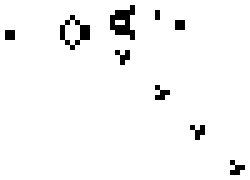
What can Physics say about life itself? Each living thing is a little self-sustaining non-equilibrium open system. It produces entropy by dissipating energy using the flux of matter and energy that flows through it. The information in the DNA and in the memes, if any, is accumulated by biological and cultural evolution and passed down to many copies of successful organisms. Multicelled organisms are emergent from the cooperation of single cells, each working blindly without central control. The biosphere is a larger version of this game using species. It is ultimately powered by sunlight and connected, via many feedback loops, to the evolution of the whole Earth system. Evolution is not over and, contrary to myth, is as much about cooperation as it is about competition.
There are probably many instances of this whole process operating in our galaxy.
Conway's Game of Life is a startling example of how complexity can emerge from the simple local rules in a "game". You can try it here. The rules applied locally (using only information from nearest neighbours) produce amazing structures globally. Life is deterministic --- there is nothing random about it, except possibly its initial conditions. Life displays Universal Computation and so is, in a sense, infinitely complex. A universal computer, that can in principle calculate or simulate anything that can be computed, has been designed using only Life components. Once a Life pattern is established, it is sensitive to perturbations and has power-law avalanches of activity --- in other words, it displays SOC. If a simple game like Life can display such complexity, what about a soup of organic molecules in some warm little pond?
In this course, we have really just sketched the full scope of emergence in the natual world. Hope you had as much fun as I did.
Tablet notes: [ Lec23 ]
FIN